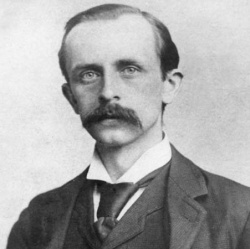J. M. Barrie

Sir James Matthew Barrie (9 may 1860 - 19 june 1937), better known as J. M. Barrie, was a Scottish writer and playwright, famous for having created the character of Peter Pan.
He was a friend of Sir Arthur Conan Doyle. At the beginning of his writing career, Conan Doyle has worked on a new magazine called The Idler, which allowed him to meet other writers including James Barrie. Both Scots, they attended the University of Edinburgh. They were passionate cricket players and Conan Doyle played in the team founded by Barrie, called The Allahakbarries (Barrie's pun related to his name and the Arab phrase "God is great").
Teasing his friend about his small size, Conan Doyle wrote that there was nothing small in Barrie except his body. In 1893, as Conan Doyle made a lecture tour in Scotland, he visited Barrie in his childhood home of Kirriemuir. A few weeks later, Conan Doyle received a telegram from Barrie asking him to come to him because he was sick and needed help. Conan Doyle rushed to the bedside of his friend and discovered that he suffered from two problems: the first was bronchitis and the second an anxiety attack due to a write command that he was failing to honour. It was a booklet for an operetta titled Jane Annie; or, The Good Conduct Prize. Conan Doyle helped him to revise and finish it for him.
J. M. Barrie also wrote three pastiches about Sherlock Holmes : My Evening with Sherlock Holmes (1891), The Adventure of the Two Collaborators (1893) and The Late Sherlock Holmes (1893) where Dr. Watson is accused of the murder of Sherlock Holmes before being innocented when Holmes is found alive.
It's Conan Doyle's enthusiasm for spiritualism which will create a barrier between the two friends, so that Barrie asked that this topic was not discussed in his presence. When Conan Doyle died in 1930, Barrie wrote: « I have always thought him one of the best men I have ever known, there can never have been a straighter nor a more honourable. »